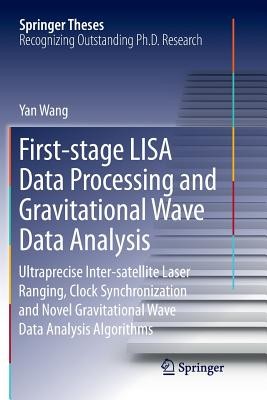
- We will send in 10–14 business days.
- SAVE -10% with code: EXTRA
First-Stage Lisa Data Processing and Gravitational Wave Data Analysis (e-book) (used book) | bookbook.eu
Reviews
Description
This thesis covers a diverse set of topics related to space-based gravitational wave detectors such as the Laser Interferometer Space Antenna (LISA). The core of the thesis is devoted to the preprocessing of the interferometric link data for a LISA constellation, specifically developing optimal Kalman filters to reduce arm length noise due to clock noise. The approach is to apply Kalman filters of increasing complexity to make optimal estimates of relevant quantities such as constellation arm length, relative clock drift, and Doppler frequencies based on the available measurement data. Depending on the complexity of the filter and the simulated data, these Kalman filter estimates can provide up to a few orders of magnitude improvement over simpler estimators. While the basic concept of the LISA measurement (Time Delay Interferometry) was worked out some time ago, this work brings a level of rigor to the processing of the constellation-level data products.
The thesis concludes with some topics related to the eLISA such as a new class of phenomenological waveforms for extreme mass-ratio inspiral sources (EMRIs, one of the main source for eLISA), an octahedral space-based GW detector that does not require drag-free test masses, and some efficient template-search algorithms for the case of relatively high SNR signals.
EXTRA 10 % discount with code: EXTRA
The promotion ends in 21d.15:03:32
The discount code is valid when purchasing from 10 €. Discounts do not stack.
- Author: Yan Wang
- Publisher: Springer
- ISBN-10: 3319799479
- ISBN-13: 9783319799476
- Format: 15.6 x 23.4 x 1.4 cm, minkšti viršeliai
- Language: English English
This thesis covers a diverse set of topics related to space-based gravitational wave detectors such as the Laser Interferometer Space Antenna (LISA). The core of the thesis is devoted to the preprocessing of the interferometric link data for a LISA constellation, specifically developing optimal Kalman filters to reduce arm length noise due to clock noise. The approach is to apply Kalman filters of increasing complexity to make optimal estimates of relevant quantities such as constellation arm length, relative clock drift, and Doppler frequencies based on the available measurement data. Depending on the complexity of the filter and the simulated data, these Kalman filter estimates can provide up to a few orders of magnitude improvement over simpler estimators. While the basic concept of the LISA measurement (Time Delay Interferometry) was worked out some time ago, this work brings a level of rigor to the processing of the constellation-level data products.
The thesis concludes with some topics related to the eLISA such as a new class of phenomenological waveforms for extreme mass-ratio inspiral sources (EMRIs, one of the main source for eLISA), an octahedral space-based GW detector that does not require drag-free test masses, and some efficient template-search algorithms for the case of relatively high SNR signals.


Reviews